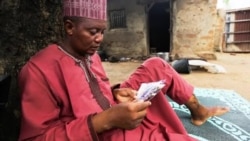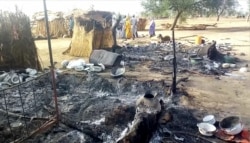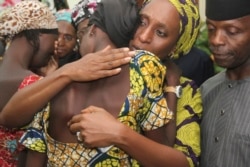In an August 19 interview with the BBC’s “Focus on Africa” program, Nigeria’s Minister of Information and Culture Alhaji Lai Mohammed claimed victory in the government’s fight against Boko Haram and other terror groups.
“The truth of the matter is that the Nigerian government is winning the war against insurgents; we are winning this war.”
That is false.
Boko Haram, along with ethnic and successionist militias, remains active in most of Nigeria’s northern territories. Attacks against government and civilian targets and mass abductions for ransom continue.
Violence increased 28% in Nigeria in the first six months of 2021, compared with the previous six months, according to the non-governmental Armed Conflict Location and Event Data Project (ACLED). Fatalities from violence rose 61% in Nigeria to 5,197, ACLED reported.
Boko Haram, Nigeria’s most notorious terror group, had been competing with Islamic State in West Africa Province (ISWAP), but that rivalry may be ending and raising the threat levels: In late July, some in Boko Haram pledged allegiance to Islamic State.
On August 30, the Islamic State-backed faction of Boko Haram overtook the town of Rann in Borno State on the Nigerian border with Cameroon.
"While most of the villagers ran away for safety, some were held by the insurgents," according to the SaharaReporters news agency. The gunmen came Sunday night "with heavy machine guns and trucks and dislodged Nigerian troops," the report said.
More than 30,000 bandits are operating in northeast Nigeria alone, and kidnapping for ransom is rampant, according to Bulama Bukarti, an extremism analyst at the Tony Blair Institute for Global Change in London.
About 1,000 students have been kidnapped for ransom this year alone, the BBC reported on August 27.
According to Reuters, families paid more than $18 million in ransom from 2011 to 2020. Many had to sell all their possessions, including their houses, while the government failed to protect schoolchildren from kidnapping or help to free them.
Five days after minister Mohammed’s claim that the government is winning the war, an unnamed group attacked Nigerian Defense Academy in the city of Kaduna, the capital of northwestern Kaduna State. The attackers retreated after killing three officers and kidnapping a senior officer.
Since 2012, the Nigerian militias have expanded their activities into the neighboring countries of Cameroon, Niger, and Chad. By May 2019, cross-border attacks and abductions had become common, ACLED reported.
“The composition of Boko Haram’s operations outside of Nigeria are significantly different between the group’s 2016 and 2019 geographic expansions. 31% of events in 2016 were comprised of violence against civilians and 29% were battles with government forces; in 2019, 64% are violence against civilians and 18% are battles with government forces.”
The expansion and the attacks on civilians continued in 2020 and 2021 as shown on the ACLED dashboard that displays data from July 2020 to July 2021. In that period, there have been 2,670 violent attacks in Nigeria that left 8,760 dead; 1,167 attacks that killed 1,441 in Cameroon; 126 attacks and 856 deaths in Chad; and 404 attacks with 1,066 deaths in Niger.
On August 25, Boko Haram militants killed 16 soldiers in an attack on a military post in southern Niger, according to the country’s defense ministry.
Nigerian President Muhammadu Buhari, a retired general, has repeatedly claimed the government is winning its war against insurgency. After taking office in 2015, he told the BBC that Nigeria had “technically won” against Boko Haram and that the group could “no longer mount conventional attacks.”
But six years later, Nigeria is still “buffeted by crisis on all sides,” living in the “atmosphere of fragmentation,” Sa’eed Husaini, researcher at the University of Lagos wrote in an opinion piece for The New York Times in June. States in southeast and southwest now are seeing the rise of “ethnonationalist separatist militias led by regionally dominant ethnic groups calling for secession” while “Boko Haram and its rivals continue to terrorize the country’s northeast,” Husaini wrote.
The United Nations-affiliated news agency The New Humanitarian reported on August 19, that Buhari's intelligence offices have been running a top-secret program to deflate Boko Haram. Fighters are offered to defect in exchange for amnesty and a life on a government payroll. This includes senior jihadists who "have almost certainly committed atrocities but are unlikely to be prosecuted."








